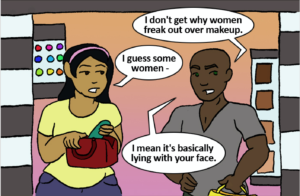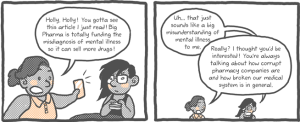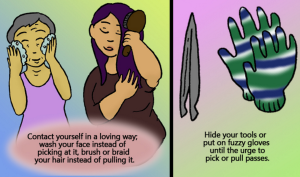
Source: Img Kid
Originally published on Role Reboot and republished here with their permission.
(Content Warning: Mention of sexual assault and harassment)
Last week, I sent my mother an article announcing the new documentary Anita, about Anita Hill, a law professor who testified in 1991 that she had been sexually harassed by then-Supreme Court nominee Clarence Thomas.
My mother insisted I go see the film so that I “wouldn’t forget what it was like.”
At the theater, accompanied by three young lawyer friends, an older moviegoer stopped us on the way out: “I’m glad you girls came to this.” She added, “It’s important to remember.”
But remember what, exactly?
Remember that Anita gave it everything she had, and the system still failed her? Remember that they didn’t call other women with similar allegations to testify? Remember that witnesses backed her up, and it mattered not? Remember that she took the polygraph and passed and Clarence Thomas refused?
He called it a “high tech lynching for uppity blacks,” and in a single soundbite scared the pants off of the old white guys on the dais. Any sympathy they may have had for Anita Hill was blown to dust when he pulled, literally, the card they were least prepared to address. He won. He’s been on the bench for thirteen years.
Is that what I’m supposed to not forget?
No. I refuse to let that be all that I take from Anita.
She did what good girls like her were taught not to do: She made a scene. Not a hissy fit or temper tantrum, but a dignified, epic, supreme scene. She made them uncomfortable and embarrassed.
And when they punished and humiliated her for making them feel that way, she said, “Good. You should be uncomfortable. Because this is uncomfortable. Be embarrassed. Because this is embarrassing.”
In a Q&A on Jezebel last Sunday, author and MSNBC host Melissa Harris-Perry gave advice to women conducting themselves in the workplace:
But I think it is very important for junior women to be comfortable with not having to be nice. It is far more important to be smart. I am not suggesting you be mean or awful, but nice is overrated… Speak up in meetings. Disagree openly and respectfully. Have the best prepared argument in the room. You want your senior colleagues to perceive you as formidable, not comfortable.”
We girls are taught to smooth the edges of our conversational style. We are taught to tamp down our opinions so they don’t seem so radical, so pointed, so angry. Don’t draw so much attention to yourself. Don’t scare the men away. Don’t make a scene.
We are taught to work hard to make people feel at ease.
At its best, this teaching facilitates openness and inclusivity, courtesy, and generosity. At its worst, it makes us prioritize the comfort of others over our own needs.
We are taught that sometimes being liked and respected are mutually exclusive, and it’s always better to be liked.
But sometimes making a scene is the only way to be heard, and sometimes being heard is the only way to save yourself.
In the blockbuster Divergent, much has been made of a script change that added an attempted sexual assault that wasn’t in the book. Blogger Peyton Thomas argues that the additional scene has power because Tris, the teenaged heroine, fights back, says no, and is applauded for making a scene:
She awakes to a crowd of exam proctors applauding her. Cheering her on. Patting her on the back. Telling her how brave and smart and strong she is. Telling her that she did exactly the right thing. That she’s a model for the other trainees. Have you ever seen anything like this? Have you ever seen a teenage girl fight off a rapist on camera, let alone be congratulated for it? I wept. Openly. Vocally. Because I had been there, in that bedroom, with someone I liked, and I had been too afraid to hit back. Too afraid to say no.”
How many times have you ignored something terrible, large or small, because to say something would be to cause a scene? You know it needs a spotlight, but why does it have to be you who invites attention?
You’re just going about your day. You’re just trying to stay out of trouble. You’re just a good girl trying to do your job.
Remember what happened to Adria Richards when she called out sexist behavior at a tech conference? Rape threats (and she was fired).
Remember what happened to Anita Sarkeesian when she pointed out misogyny in video game culture? Rape threats.
Remember what happened to Lindy West when she spoke about sexism in comedy? Rape threats.
Remember what happened to Anita Hill in 1991 when she told her story of sexual harassment in the workplace?
But there are two choices here. Let it go – let sexual harassment go unmentioned at the hearing of a sexual harasser, let discrimination go undiscussed, let sexism go unaddressed, let misogyny go unmentioned.
Or make a scene.
It might make your life harder, yes, but someone has to do it.
If Anita can, so can you.
[do_widget id=”text-101″]
Emily Heist Moss is Role Reboot regular contributor and a New Englander in love with Chicago, where she works in a tech start-up. She blogs every day about gender, media, politics and sex at Rosie Says, and has written for Jezebel, The Frisky, The Huffington Post and The Good Men Project. Find her on Facebook and on Twitter @EmilyHeistMoss.
Search our 3000+ articles!
Read our articles about:
Our online racial justice training
Used by hundreds of universities, non-profits, and businesses.
Click to learn more




















